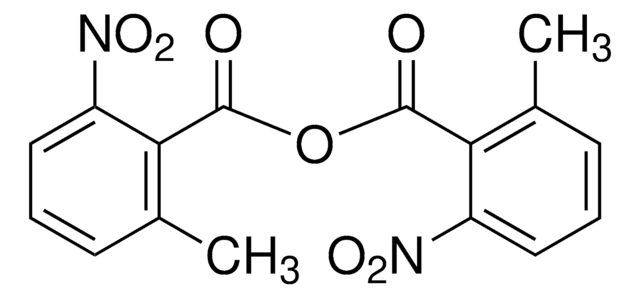107700
4-(Dimethylamino)pyridine
ReagentPlus®, ≥99%
Sinónimos:
N,N-Dimethylpyridin-4-amine, DMAP
About This Item
Productos recomendados
Nivel de calidad
Línea del producto
ReagentPlus®
Análisis
≥99%
formulario
chips
crystalline powder
flakes
mp
108-110 °C (lit.)
solubilidad
H2O: 50 mg/mL
temp. de almacenamiento
room temp
cadena SMILES
CN(C)c1ccncc1
InChI
1S/C7H10N2/c1-9(2)7-3-5-8-6-4-7/h3-6H,1-2H3
Clave InChI
VHYFNPMBLIVWCW-UHFFFAOYSA-N
¿Está buscando productos similares? Visita Guía de comparación de productos
Categorías relacionadas
Descripción general
Aplicación
- To synthesize 3,5-disubstituted 2,6-dicyanoaniline by reacting malononitrile, aldehydes, and β-nitroolefins.
- For the acylation of alcohols with acid anhydrides under auxiliary base- and solvent-free conditions to synthesize corresponding esters.
- In Baylis-Hillman reaction to form carbon-carbon bond by the coupling of an activated alkene with an aldehyde or ketone.
Información legal
Palabra de señalización
Danger
Frases de peligro
Consejos de prudencia
Clasificaciones de peligro
Acute Tox. 2 Dermal - Acute Tox. 3 Inhalation - Acute Tox. 3 Oral - Aquatic Chronic 2 - Eye Dam. 1 - Skin Irrit. 2 - STOT SE 1
Órganos de actuación
Nervous system
Código de clase de almacenamiento
6.1A - Combustible acute toxic Cat. 1 and 2 / very toxic hazardous materials
Clase de riesgo para el agua (WGK)
WGK 3
Punto de inflamabilidad (°F)
255.2 °F
Punto de inflamabilidad (°C)
124 °C
Equipo de protección personal
Eyeshields, Faceshields, Gloves, type P3 (EN 143) respirator cartridges
Certificados de análisis (COA)
Busque Certificados de análisis (COA) introduciendo el número de lote del producto. Los números de lote se encuentran en la etiqueta del producto después de las palabras «Lot» o «Batch»
¿Ya tiene este producto?
Encuentre la documentación para los productos que ha comprado recientemente en la Biblioteca de documentos.
Los clientes también vieron
Nuestro equipo de científicos tiene experiencia en todas las áreas de investigación: Ciencias de la vida, Ciencia de los materiales, Síntesis química, Cromatografía, Analítica y muchas otras.
Póngase en contacto con el Servicio técnico






![1,8-Diazabiciclo[5.4.0]undec-7-eno 98%](/deepweb/assets/sigmaaldrich/product/structures/120/564/5b373e23-1624-489c-8efb-692de0f96ffb/640/5b373e23-1624-489c-8efb-692de0f96ffb.png)






